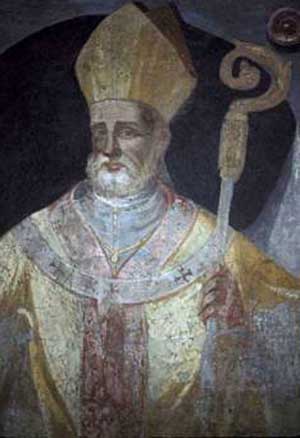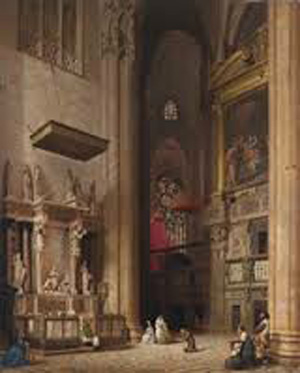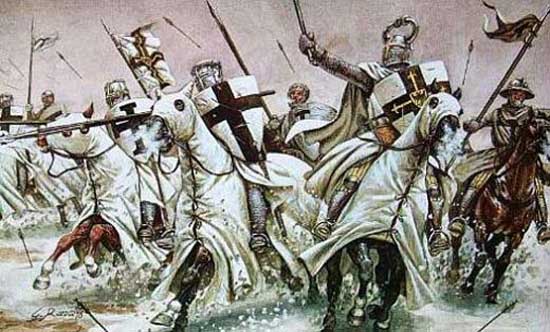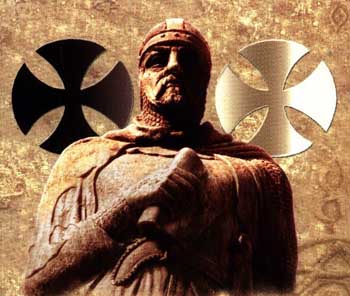 |
The Saint of the Day
St. Galdinus of Milan, April 18
Prof. Plinio Corrêa de Oliveira
Biographical selection:
Galdino or Galdinus (c. 1096 –1176), was the son of the noble della Sala family of Milan and was educated from his childhood for the ecclesiastical life. He received sacred orders after occupying various important positions and became the chancellor of the Church in Milan. In 1165, Pope Alexander III made him cardinal of that city.

St. Galdinus, Cardinal of Milan (c. 1096 –1176) |
One of his first aims was to destroy the schism created by partisans of “pope” Victor IV favored by Emperor Frederick Barbarossa and bring them to recognize the legitimate Pontiff Alexander III. In this mission he skillfully employed the diplomatic gifts he had acquired.
Galdinus was very humble, even after reaching this elevated position. He was known for his sweetness and goodness, welcoming all as equals, except in the case of defending his position, when he was an example of fortitude and vigor.
At that time the Cathars from Cologne were spreading their errors throughout Lombardy and the area of Milan. Galdinus strived zealously to uproot those heresies. His constant preaching and efforts weakened him and his physical strength waned.
In 1176, the Sunday after conducting the Easter ceremonies, he went to the Altar Tecla in Milan Cathedral to celebrate Mass but found himself too weak to do so. Nonetheless, at the sermon he went to the pulpit and delivered a long and vehement homily refuting the heresies and infamies of the Cathars with greater violence than ever. As he finished, he fainted and lost consciousness. He died as the Mass ended, whose Gospel had been that of the Good Shepherd.
Comments of Prof. Plinio:
This selection is a good example of a bad summary of a Saint's life. It offers a series of platitudes about the life of a Saint – which should have been very interesting – that gives almost no leeway for comments. He was very humble, very sweet, had great vigor, combated heresy, occupied important positions etc. These things could be said of almost any saint. What commentary can we make about these banalities? None.

Altar of St. Tecla inside Milan Cathedral, where St. Galdinus died |
The only thing worthy of comment from this selection is his apostolic ardor that drove him to fight heresy until the last breath of his life.
We see that he was very sick, worn out from his many labors. When he went to celebrate Mass, he found himself without the strength to say it. But, he was so opposed to the enemy that, even in this weak state, he ascended to the pulpit and gave a great sermon against the heretics, a sermon more energetic and ardent than all the others he had delivered before. This was his last act; after that he died.
In this there is a great beauty because we have the impression that he gathered the last of his strength to make a supreme charge against the enemy. It is very beautiful to see this mobilization of his last energies for a supreme fight. It is also beautiful to see him at the very apogee of his zeal, which allowed him to pull together his best forces to serve him at the height of his indignation.
Here we see him simultaneously at the end of his physical health and at the plenitude of his spiritual health. He acted like a general who assembles all his remaining knights to make a supreme cavalry charge in order to completely smash his enemies and dies in this last effort. There is a profound beauty in the concurrence of his plenitude of soul and debility of body, and also in the fact that his supreme attack was made at the supreme moment of his death.
It is like an arrow that flies with its full impetus and vigor and hits the mark at the last moment. It is like a canon projectile that, at the moment of hitting its target, destroys it completely because the shot was true and strong, with its full speed and capacity of destruction.

His sermon - a final calvary charge against the enemy |
Someone could object: Well, would it not have been more beautiful if he had died smiling and saying: “My dear Cathars, my little children, I implore you to convert. I love you”?
I respond with a lesson that has already been repeated among us a thousand times and that must still be repeated a thousand times more. It is this: That there are heretics for whom words of goodness make absolutely no difference. Toward these persons one must show force and fight them because they are so hardened that any form of condescendence on our part represents concession and retreat.
In the last act of St. Galdinus’ life we see an example of this lesson. For the obdurate heretics, he had only words of denunciation, censure and refutation and he died.
So, also, should be the death of the ultramontane, of the counter-revolutionary. Because regarding the Revolution – the worst of the heresies that has ever appeared and that produces the greatest obduracy of soul – what is required is the keenest polemic spirit, the most inflexible and most ardent sense of combat, which should animate us to draw together our last forces to attack it.

As counter-revolutionaries, we should always be ready to fight against error & heresy |
This militant stance – which should be our position at the hour of our death – should be our constant goal in this life, and even in Heaven. Indeed, St. Therese of Lisieux said that she wanted to spend her Heaven doing good upon earth. We as counter-revolutionaries should ask for something analogous, but different: We would like to pass our Heaven asking God to punish the enemies of the Church, to confound the heretics.
Is it licit to ask for others to be punished? Yes, of course it is. We should, however, always prefer mercy to justice. Our prayer should be: “My God, I pray for the conversion of these persons as soon as possible. But, if they do not convert, then, I pray that they may be fully chastised in order to completely demolish the plots and machinations they make against the Catholic cause.”
This is the prayer of the good Catholic. It is because this militant spirit is lacking and prayers like this are not made that you see evil go unpunished in our days.


  |
|
Prof. Plinio Corrêa de Oliveira | |
The Saint of the Day features highlights from the lives of saints based on comments made by the late Prof. Plinio Corrêa de Oliveira. Following the example of St. John Bosco who used to make similar talks for the boys of his College, each evening it was Prof. Plinio’s custom to make a short commentary on the lives of the next day’s saint in a meeting for youth in order to encourage them in the practice of virtue and love for the Catholic Church. TIA thought that its readers could profit from these valuable commentaries.
The texts of both the biographical data and the comments come from personal notes taken by Atila S. Guimarães from 1964 to 1995. Given the fact that the source is a personal notebook, it is possible that at times the biographic notes transcribed here will not rigorously follow the original text read by Prof. Plinio. The commentaries have also been adapted and translated for TIA’s site.
|
Saint of the Day | Home | Books | CDs | Search | Contact Us | Donate

© 2002- Tradition in Action, Inc. All Rights Reserved
|
 |

|